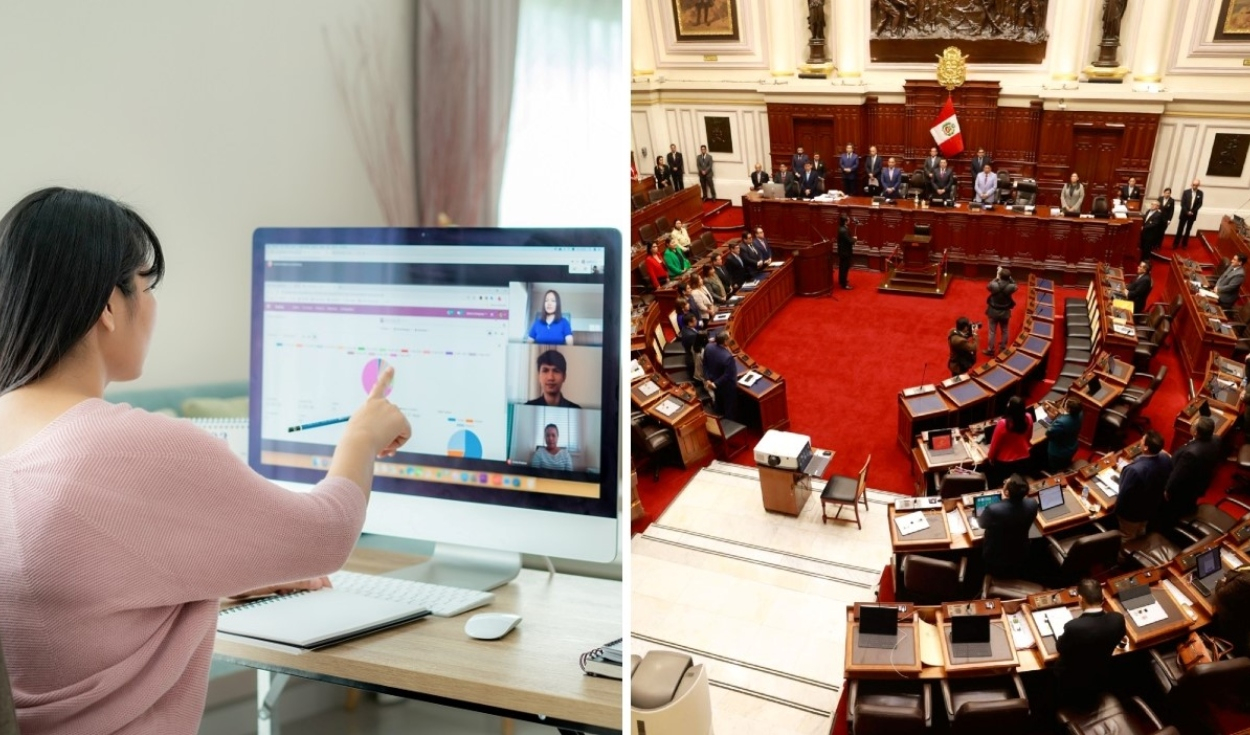
By majority vote, the Plenary Session of Congress approved last Thursday, May 30, a series of modifications to the Teleworking Law. One of them is the prohibition of the particular activities carried out by workers subject to this modality during their working day, which could constitute a serious disciplinary offense and the initiation of a disciplinary procedure.
The opinion that 96 parliamentarians validated includes legislative initiative 5889/2023-CR, whose authorship belongs to the former president of Parliament, María del Carmen Alva. After being exonerated from the second vote, the norm was ready to be sent to the Executive Branch, which could observe it or authorize its publication in the Official newspaper El Peruano.
They approve a law that prevents particular activities in teleworking
With 96 votes in favor, four against and one abstention, the Plenary Session of Congress gave the green light to the opinion that modifies articles 6, 11, 12, 21 and 23 of the Teleworking Law, regarding the rights and duties of employees who work under this modality. Within its main scope, They highlight that teleworkers will be prevented from carrying out particular activities during the working day, as well as being absent from the workplace unjustifiably.
“In the latter case, if you carry them out, you must justify them. Failure to present the justification constitutes a serious disciplinary offense, being causal for the initiation of a disciplinary procedure and subsequent sanction, as appropriate, which may provide for the automatic reversal of the modality of teleworking.”, reads article 21 of said standard.
Likewise, article 6 specifies that the time not worked by the teleworker due to power outages or due to lack of duly accredited internet service cannot be a reason for a discount in the teleworker’s remuneration nor is it object of later recovery.
Another change that the opinion of the Labor and Social Security Commission raises is regarding the change in the usual place of teleworking. In this circumstance, the worker must inform his superior five business days in advance, unless duly justified cause.
“The teleworker guarantees the optimal computing and communication conditions to carry out teleworking appropriately. From the point of view of occupational risk prevention, the employer identifies the dangers and evaluates the risks to which the teleworker would be exposed, and implements the corresponding corrective measures, for which the teleworker provides easy access to their new usual teleworking place,” indicates article 11 of the law.
Finally, the standard requires that for the hiring of teleworkers or for the change of service provision modality, the conditions for the removal of confidential documentation from the entity’s facilities be established, as well as the mandatory provision of taking active breaks during the working day.
What did the congressmen say about this law that modifies teleworking?
During the debate in the Plenary Session, the president of the Labor Commission, Pasión Dávila, highlighted the importance of this ruling to avoid misinterpretations or incorrect applications of the teleworking modality.
“From the Labor Commission we consider it important to approve this legislative initiative because it establishes clarifications to the current standard on points that could lead to conflicts, as well as the standard prevents and avoids future misinterpretations or incorrect applications of the telecommuting. In the long run it will avoid conflicts in the development of the labor and individual relationship between the worker and the employer,” he said.
However, the non-group parliamentarian, Jaime Quito, considered that “The law brings some appropriate changes for teleworking, but they are also approving that any disconnection of the worker is grounds for dismissal. Without evaluating the circumstances, they directly classify it as serious misconduct. They are giving absolute power to the employer.”
Source: Larepublica
Alia is a professional author and journalist, working at 247 news agency. She writes on various topics from economy news to general interest pieces, providing readers with relevant and informative content. With years of experience, she brings a unique perspective and in-depth analysis to her work.











